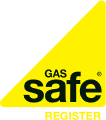Safety Check Your Gas Appliances
Any domestic gas appliance can produce carbon monoxide (CO), a highly poisonous gas which occurs when natural gas or liquid petroleum gas (LPG) doesn’t burn as it should. This is the result of a gas appliance being improperly fitted, repaired, or maintained, or when vents, flues or chimneys have become blocked - and that’s why it’s so important to have all of your gas appliances checked once a year by a Gas Safe registered engineer.
What are the risks of unsafe gas appliances?
The main risks that can arise from having an unsafe gas appliance in your home:
- Carbon monoxide poisoning - Carbon monoxide (CO) is a highly poisonous gas that can be especially deadly because you can’t see, taste or smell it.
- Gas leaks - A gas leak can cause fires or explosions. If you think you can smell gas, then you’ll need to call your emergency service provider immediately. During a gas safety check, a Gas Safe registered engineer will do a visual inspection of pipework and a tightness test to confirm there aren’t any gas leaks.
- Fires and explosions - Safe appliances burn gas in a controlled way, but a faulty appliance or pipework may leak gas which can then be ignited, causing a fire or explosion.
We also highly recommend getting your gas pipework inspected at the same time as your annual gas safety check. As a landlord it is also law to maintain pipework.
Free gas safety check reminder
We know how busy everyday life can be, which is why we offer a free gas safety check reminder service at StayGasSafe.co.uk. Simply sign up and we’ll send you a quick text or email to let you know when it’s time for your annual gas safety check.
What is a gas safety check?
A gas safety check should only be performed by a qualified Gas Safe registered engineer, who will test your gas appliances to make sure they’re safe to continue operating in your home.
A gas appliance safety check ensures an appliance:
- Is properly set and adjusted so the gas burns correctly
- Is suitable for the room it’s located in
- Is physically stable, securely fitted and properly connected to the gas pipework
Your engineer will also make sure:
- There’s an adequate and permanent air supply that’s suitable for the appliance installed
- All safety devices are functioning properly
- Any flues, chimneys and air vents are operating correctly
This can be extended to a full gas installation safety check, in which the engineer will:
- Check the installation is in good condition by visually inspecting the pipework as far as reasonably practicable
- Test the gas pipework to make sure there are no leaks
CO can enter buildings through shared vents, so if you do live in a property with a shared flue or chimney, be sure to share responsibility with other residents to get these checked out annually.
Know the warning signs of a faulty gas appliance
Look out for these signs. If you spot any of them, you’ll want to get your gas appliance serviced by a Gas Safe registered engineer straight away:
- Your appliance isn’t working properly
- It produces a floppy yellow flame rather than a crisp blue one
- Black/brown marks on or around the appliance
- The boiler pilot light keeps going out
- Increased condensation inside the windows
It is recommended that any gas appliance has an annual safety check and service – unless the manufacturer’s guidelines recommend otherwise.
While an annual gas safety check will make sure your gas appliances are working as they should be, an appliance service, as a minimum, is what you’ll need from a Gas Safe registered engineer if you notice any of the warning signs which point to an unsafe appliance.
What is a gas appliance service?
A gas appliance service includes all the usual steps on a routine gas safety check list, but your engineer will undertake a more specific gas appliance inspection with additional tests as detailed in the manufacturer’s instructions. These may include:
- Analysis of the combustion exhaust gases to ensure the appliance is burning gas safely
- A check of the appliance’s condition including signs of heat or distress, effectiveness of seals and gaskets, and cleanliness of heat exchangers.
It’s worth noting that your Gas Safe registered engineer might need to make additional or different checks, because requirements vary depending on the appliance type and model. For example, a boiler gas safety check or service might be different to a gas cooker safety check or service.
Do I get any paperwork upon completion of a gas safety check or service?
Depending on the work they’ve carried out, you might be given a Gas Safety Record. This isn’t a legal requirement, so it’s a good idea to check with the registered business before they come out to visit you. Head to our Gas Safety Records page for more information.
When they’re assessing an unsafe gas appliance, all Gas Safe registered engineers will follow the Gas Industry Unsafe Situations Procedure (GIUSP).
What’s the cost of a gas safety check or service?
Your gas safety check cost or service cost will depend on the Gas Safe registered engineer you choose, but certain circumstances, such as being on means tested benefits, might mean you qualify for a free gas appliance check.
Get in touch with your energy supplier to see whether you’re eligible for a free gas safety check.
How do I find a qualified gas engineer?
To find a Gas Safe registered business simply enter your postcode on our engineer search page, choose the appliance type you're looking for them to work on and click 'search'. You’ll then be able to identify the business’ engineers and check their qualifications.
Related Help Topics
Useful Downloads
-
IGEM-G-11 Ed 2 with amendments July 2022 and June 2024
Featured Content
Understand The Gas Safe ID Card
The Gas Safe ID card is a great indication that an engineer’s qualified and registered to do gas work – but what do you need to look for when the engineer shows you their card? You can find out in this section.
What Do The ID Categories Mean
Find out about the Gas Safe ID card and what you need to look out for on the back of the card.
Gas Safety Certificates & Records
What’s the difference between a Building Regulations Compliance Certificate and a Gas Safety Record, and when do you need them? More info here.



